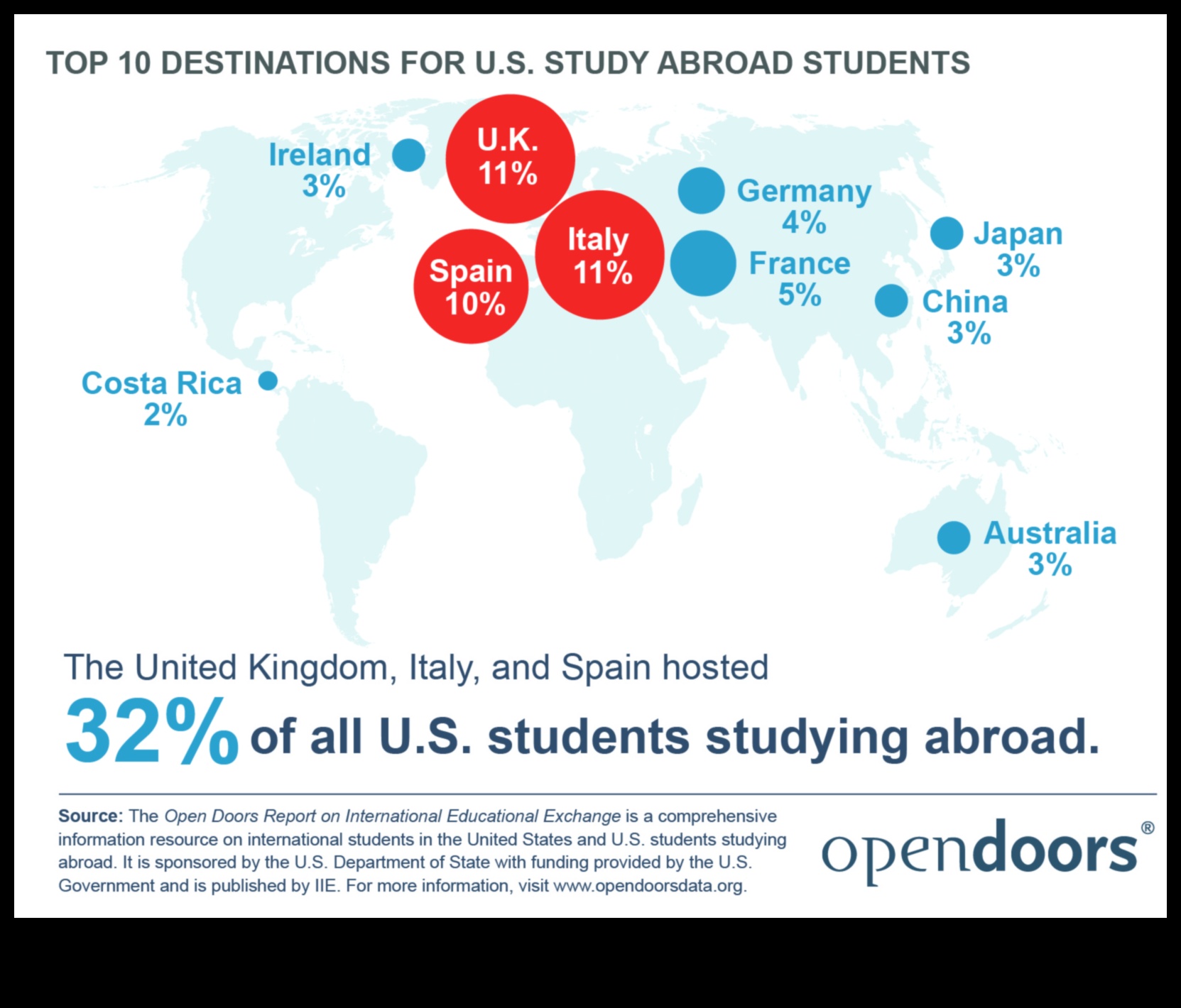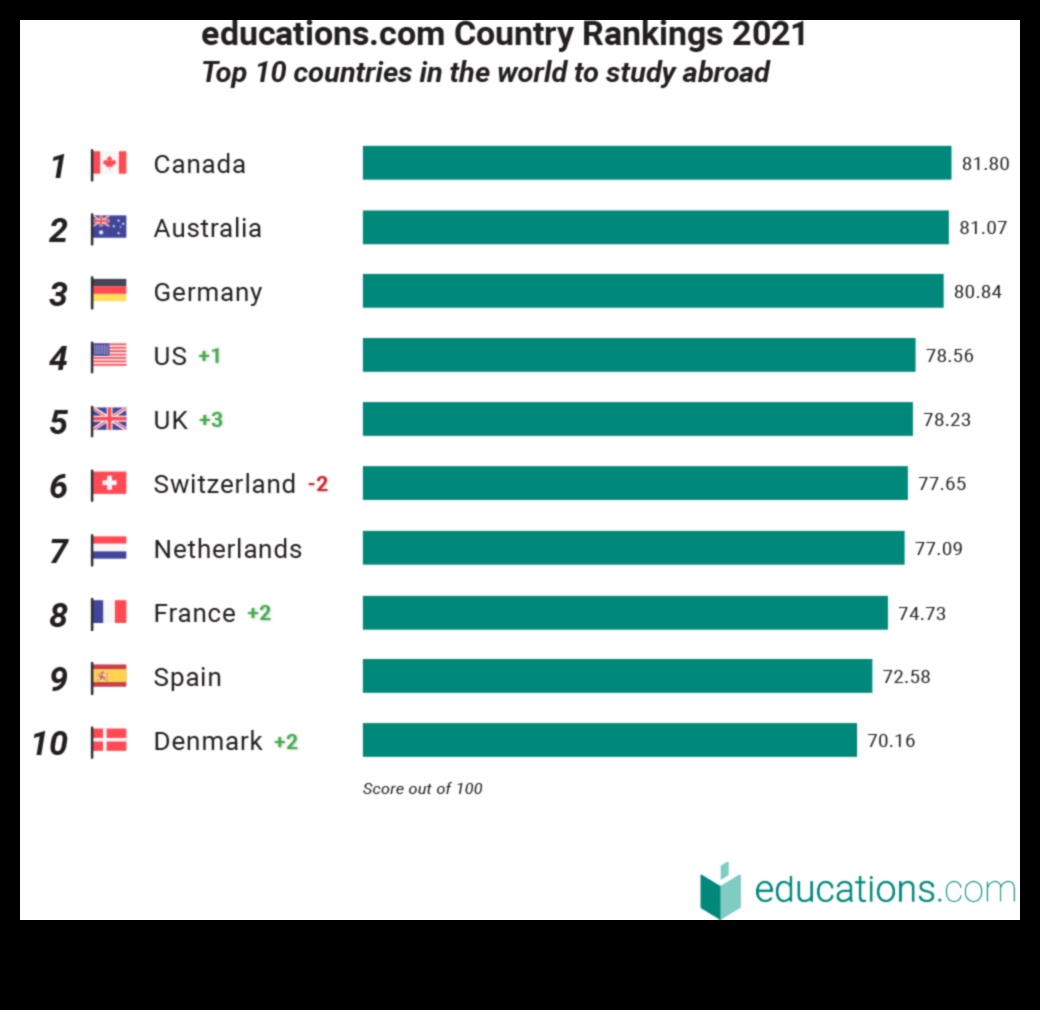
Where Should I Study Abroad?
This guide provides information on the best places to study abroad, factors to consider when choosing a study abroad destination, and tips for applying to study abroad programs.

I. Introduction
Studying abroad is an amazing opportunity to learn about a new culture, improve your language skills, and make lifelong friends. There are many different factors to consider when choosing a study abroad destination, such as the cost of living, the quality of education, and the culture of the country.
This guide will help you narrow down your options and choose the best study abroad destination for you.
II. Factors to Consider When Choosing a Study Abroad Destination
When choosing a study abroad destination, there are a few factors you should consider:
- Cost of living: The cost of living in different countries varies significantly. It’s important to factor in the cost of housing, food, transportation, and other expenses when choosing a study abroad destination.
- Quality of education: The quality of education varies from country to country. Some countries have a more rigorous educational system than others. It’s important to research the quality of education at different universities and colleges before making a decision.
- Culture: The culture of a country can have a significant impact on your study abroad experience. It’s important to choose a country whose culture you’re interested in learning more about.
- Language: If you don’t speak the language of the country you’re planning to study in, you’ll need to consider the availability of language courses. It’s also important to factor in the difficulty of learning the language.
- Visa requirements: Before you can study abroad, you’ll need to make sure you meet the visa requirements for the country you’re planning to visit.

III. Top 10 Study Abroad Destinations
The following is a list of the top 10 study abroad destinations, based on factors such as the cost of living, the quality of education, and the culture of the country:
- United Kingdom
- Australia
- Canada
- France
- Germany
- Italy
- Spain
- Japan
- South Korea

IV. Cost of Studying Abroad
The cost of studying abroad varies significantly depending on the country you choose. The following is a general overview of the cost of studying abroad in different countries:
- United Kingdom: £10,000-£15,000 per year
- Australia: AUD$20,000-AUD$30,000 per year
- Canada: CAD$15,000-CAD$25,000 per year
- France: €10,000-€15,000 per year
- Germany: €8,000-€12,000 per year
- Italy: €10,000-€15,000 per year
- Spain: €8,000-€12,000 per year
- Japan: ¥1,000,000-¥1,500,000 per year
- South Korea: KRW10,000,000-KRW15,000,000 per year

V. Scholarships and Financial Aid for Study Abroad
There are a number of scholarships and financial aid programs available for students who want to study abroad. The following are some of the most popular programs:
- The cost of living
- The quality of education
- The culture of the country
- The safety and security of the country
- The availability of scholarships and financial aid
- The visa requirements
- The health insurance requirements
- The ease of travel to and from the country
- United States
- United Kingdom
- Australia
- Canada
- France
- Germany
- Italy
- Spain
- Japan
- Study Abroad in the United States
- Study Abroad in the United Kingdom
- Study Abroad in Australia
- Study Abroad in Canada
- Study Abroad in France
- Study Abroad in Germany
- Study Abroad in Italy
- Study Abroad in Spain
- Study Abroad in Japan
- The Fulbright Scholarship Program
- The Boren Scholarship Program
- The Gilman Scholarship Program
- The Benjamin A. Gilman International Scholarship
- The Critical Language Scholarship Program
- Cost of living
- Quality of education
- Culture
- Safety
- Visa requirements
- International Student Insurance
- Study Abroad Health Insurance
- U.S. Department of State: Health Insurance
- Be aware of your surroundings and take precautions to avoid being robbed or assaulted.
- Be careful when traveling alone, especially at night.
- Avoid drinking too much alcohol or taking drugs.
- Be aware of local laws and customs.
- Stay in touch with your family and friends at home.
- Be open-minded and willing to learn about new cultures.
- Be respectful of other cultures and customs.
- Don’t be afraid to ask questions.
- Try to immerse yourself in the local culture by participating in activities and events.
- Make friends with local people.
- Be patient with yourself as you adjust to a new culture.
- The cost of living
- The quality of education
- The culture of the country
- The safety and security of the country
- The availability of scholarships and financial aid
- United Kingdom
- United States
- Australia
- Canada
- France
- Germany
- Spain
- Italy
- Japan
| Feature | Answer |
|---|---|
| Study abroad | Studying abroad is an opportunity to experience a new culture, learn a new language, and make lifelong friends. It can also be a great way to boost your resume and prepare for your career. |
| Best study abroad destinations | There are many great study abroad destinations to choose from, depending on your interests and budget. Some popular destinations include the United Kingdom, Australia, Canada, and New Zealand. |
| Cost of studying abroad | The cost of studying abroad can vary significantly depending on the destination, the program, and your living expenses. However, you can expect to pay anywhere from \$10,000 to \$50,000 per year. |
| Scholarships for studying abroad | There are many scholarships available to help students study abroad. Some of the most popular scholarships include the Fulbright Scholarship, the Marshall Scholarship, and the Rhodes Scholarship. |
| Student visas | If you are a student from outside the United States, you will need to obtain a student visa in order to study in the United States. The visa application process can be complex, so it is important to start early. |
II. Factors to consider when choosing a study abroad destination
When choosing a study abroad destination, there are a number of factors to consider, including:
It is important to weigh all of these factors carefully before making a decision on where to study abroad.
III. Top 10 study abroad destinations
The following are 10 of the most popular study abroad destinations for international students:
Each of these destinations has its own unique advantages and disadvantages, so it is important to do your research before deciding where to study abroad. Some factors to consider include the cost of living, the quality of education, the culture of the country, and the ease of travel.
For more information on each of these destinations, please see the following articles:
IV. Cost of studying abroad
The cost of studying abroad can vary significantly depending on the country you choose to study in. Some of the factors that affect the cost of studying abroad include:
* The cost of tuition and fees
* The cost of living
* The cost of transportation
* The cost of health insurance
* The cost of visa fees
In general, the cost of studying abroad is higher than the cost of studying at a university in your home country. However, there are many ways to save money on studying abroad, such as:
* Applying for scholarships and financial aid
* Choosing a less expensive country to study in
* Living with a host family or in a shared apartment
* Working part-time while you study
It is important to do your research and budget carefully before you decide to study abroad. By doing so, you can ensure that you can afford to have a positive and rewarding experience.
V. Scholarships and financial aid for study abroad
There are a number of scholarships and financial aid programs available for students who want to study abroad. These programs can help to cover the cost of tuition, room and board, travel, and other expenses.
Some of the most popular scholarships for study abroad include:
In addition to these scholarships, there are also a number of other financial aid programs that can help students study abroad. These programs are often offered by colleges and universities, as well as by private organizations.
Students who are interested in studying abroad should research the different scholarships and financial aid programs that are available. They should also contact their college or university financial aid office to learn about the programs that are offered through the school.
Studying abroad can be a great way to learn about a new culture, improve your language skills, and make new friends. With the help of scholarships and financial aid, you can make your dream of studying abroad a reality.
II. Factors to consider when choosing a study abroad destination
There are many factors to consider when choosing a study abroad destination. Some of the most important factors include:
It is important to weigh all of these factors carefully in order to make the best decision for yourself.
VII. Health insurance for study abroad
Health insurance is an important consideration for study abroad students. While you may be covered by your home country’s health insurance plan, it is important to check the terms of your coverage before you leave. Some plans may not cover you while you are studying abroad, or they may only cover you for certain types of medical expenses.
If your home country’s health insurance plan does not cover you while you are studying abroad, you will need to purchase a separate health insurance policy. There are a number of different health insurance providers that offer policies specifically for study abroad students. When choosing a health insurance policy, be sure to compare the different plans and make sure that you understand the coverage limits and exclusions.
It is also important to make sure that you have a valid passport and visa before you travel abroad. You should also check the local laws and regulations regarding health insurance in the country where you will be studying.
For more information on health insurance for study abroad students, please visit the following websites:
Safety and security for study abroad students
Studying abroad can be a safe and rewarding experience, but it is important to be aware of the potential safety risks. Here are some tips for staying safe and secure while studying abroad:
If you are ever in danger, please do not hesitate to contact the local authorities or your study abroad program.
IX. Cultural adaptation for study abroad students
Studying abroad can be a challenging and rewarding experience, but it can also be a difficult adjustment. Students who study abroad will be faced with new cultures, languages, and ways of life. It is important to be prepared for these challenges and to be open to new experiences.
Here are some tips for cultural adaptation for study abroad students:
Adjusting to a new culture can take time, but it is an important part of the study abroad experience. By being open-minded and willing to learn, students can gain a new appreciation for other cultures and make lifelong friends.
FAQ
Q: What are the factors to consider when choosing a study abroad destination?
A: There are many factors to consider when choosing a study abroad destination, including:
Q: What are the top 10 study abroad destinations?
The top 10 study abroad destinations are:
Q: How much does it cost to study abroad?
The cost of studying abroad varies depending on the destination, the program, and the length of stay. However, you can expect to pay between $10,000 and $30,000 per year for tuition, room and board, and other expenses.